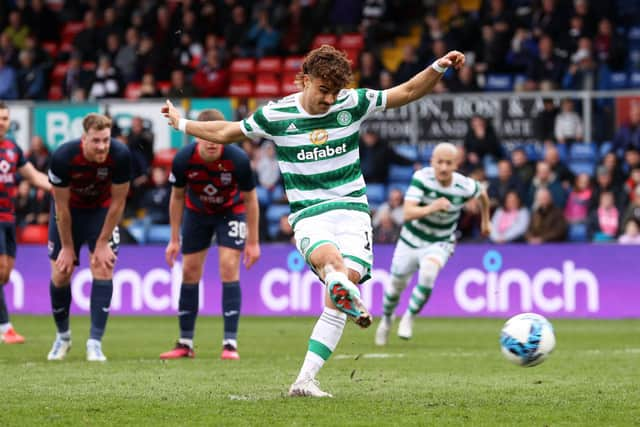Celtic reaction: Penalty comparison with Rangers; Mackay VAR oversights; McGregor-Iwata conundrum
Penalty comparison with Rangers
A spreadsheet was posted on social media by one Celtic supporter the other week that illustrated the contrast between the awarding of penalties for his team and rivals Rangers. In short, it was a conspiracy theorist’s charter, since it set out that while Celtic had a tendency to be given penalties in games they were already on course to win, such awards for the club’s Ibrox adversaries were more likely to be game-changing – arriving as they were behind or tied. Never mind that in the four seasons the list covered Rangers’ numbers for penalties were higher than those of Celtic. On the latter measure, Celtic have now received six in the league to their rivals’ total of nine. But it is notable as to when Ange Postecoglou’s men have won penalties in their past two cinch Premiership outings. At the Highlands on Sunday, Celtic were toiling to make a breakthrough, when the ball clipped the outstretched arm of Alex Iacovitti late in time added on for the first period. That action providing Jota the chance to convert from the spot and give his team a 1-0 advantage heading into the interval. Meanwhile, in the champions’ encounter that led into the international break, they were a goal down at home to Hibs when Paul Hanlon was adjudged to have pulled Cameron Carter-Vickers in the box after 52 minutes, which allowed Jota to equalise from the spot. No doubt the aforementioned Celtic punter will now grue updating his spreadsheet.
Mackay VAR oversights


It was understandable for County manager Malky Mackay to be livid over VAR operative Steven Kirkland instructing referee Willie Collum to consult his monitor after the ball struck the arm of Alex Iacovitti in the box. The Ross County captain’s arm certainly was at right angles from his body but that was then a result of the player challenging aerially with Cameron Carter-Vickers as a Matt O’Riley corner floated over. However, Mackay was wide of the mark in presenting the penalty award that ensued from this incident as a peculiarly Scottish phenomenon. “I’m looking at where the bar is set in England and where it’s set in Scotland and right now we’re not where they are,” he said. Perhaps he missed the Match of the Day highlights. For in the 3-3 draw between Brighton and Brentford, Scotland international Aaron Hickey was penalised – through the VAR route – for a handball in the area that allowed Brighton to scrape a point after he slid in with his arm slightly from his side, as befitting his lunge, and had the ball battered off it from point-blank range. In another English context, Gareth Southgate’s men won a penalty against Italy last week that followed a VAR alert when Giovanni di Lorenzo, looking to get touch tight on Harry Kane, had his arm pushing at the striker and the ball looped on to it. Celtic’s penalty against Mackay’s men was a standard award in the VAR era, then. It shouldn’t be. The biomechanics, in terms of where arms will find themselves as players leap and throw themselves around in a contact sport, has become so muddied. Officials seem to disregard, or interpret poorly, the section of the rules relating to such positioning “not [being] a consequence of, or justifiable by, the player’s body movement for that specific situation.” If an arm is out and the ball hits it, irrespective of possible mitigation, more often than not VAR becomes involved. On both sides of the border. And, indeed, beyond.
McGregor-Iwata conundrum
Advertisement
Hide AdAdvertisement
Hide AdTomoki Iwata produced an authoritative first start for Celtic in the Highland. In the holding role, he recycled the ball adroitly, his passing was measured, and he stood up to any physical challenges in screening his defence. In short, he was Callum McGregor-like. The problem was that the actual McGregor was not as influential in stepping out of the berth, both to accommodate the Japanese midfielder and compensate for the injury absences of Aaron Mooy and Reo Hatate. The Celtic captain has become so adept in the anchor role for his club that there is no-one better to be deployed in it. How Ange Postecoglou then combines the pair if he has his full array of central talents available will be a question he will require to chew over going forward.
Comments
Want to join the conversation? Please or to comment on this article.